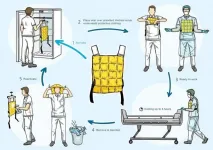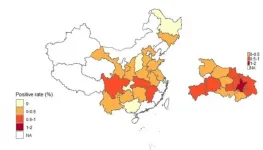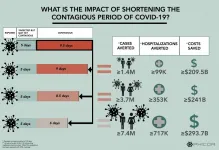(Press-News.org) Patients and healthcare providers at the Princess Margaret Cancer Centre rated virtual care during COVID-19 as highly satisfactory overall for quality of care and convenience, while at the same time saving patients millions in costs.
Research led by Princess Margaret Radiation Oncologist Dr. Alejandro Berlin showed that virtual care can be implemented rapidly and safely across a highly-specialized and high-volume cancer centre. Eighty (80) per cent of patients reported they were either very satisfied or satisfied with it, citing convenience as a main factor, with 72 per cent of physicians reporting similar satisfaction with it.
Moreover, 64 per cent of healthcare providers and 85 per cent of patients indicated that the quality of care was comparable or better than the in-person model of care. Sixty-six per cent (66%) of respondents in both groups - patients and physicians - were either very likely or likely to recommend virtual care for future appointments.
The overall cost savings for 22,085 patients studied during the research study period between March 23, 2020 and May 22, 2020 was more than $3M ($3,085,274.00CAD) - potentially $18M for one year.
Study findings are published in JAMA Oncology, January 7, 2021.
"The surprising result of implementing virtual care almost overnight were the impressive benefits for our patients and clinicians," says Dr. Keith Stewart, Director, Princess Margaret Cancer Centre, Vice President, Cancer, University Health Network and one of the study authors
"With these findings, a new normal emerges which includes virtual care as a feasible and important part of care for many patients. They will help guide the transformation of telemedicine in the post COVID-19 era, firmly establishing virtual care as a standard option that we can offer appropriate patients."
Virtual care was developed and launched at Princess Margaret 12 days after the COVID-19 pandemic was declared on March 11, 2020.
This was done to protect patients from preventable exposure and to minimize the impact of infection control measures and concerns about availability of personal protective equipment for patients and staff.
Four days after the digital solution supporting virtual care was launched on March 23, 2020, more than 50 percent of outpatient clinic visits had shifted to virtual care, consisting of either video or telephone calls.
By one month after the March 23 start date, outpatient clinic volumes (in person and virtual) were restored to pre-COVID-19 levels - about 3,900 clinic visits weekly.
In total, from March 23, 2020 to May 22, 2020, 22,085 virtual visits by phone or video took place, accounting for an average of 68 per cent of the daily clinic visits.
Importantly, both chemotherapy and radiotherapy on-site visits, along with metrics for safety and timeliness of cancer care remained stable throughout the study, comparable to the pre-COVID-19 period.
"The shift to virtual care, helped ensure that patients needing in-person visits, such as those receiving chemotherapy and radiation treatments could continue, while decreasing traffic and facilitating physical distancing on premises," explains Dr. Berlin.
"It enabled our high-volume centre to take care of all our patients during an unsettling and uncertain time - without compromising on either the safety or quality of care."
Institutional and province-defined quality standards of cancer care - such as safety incidents and referrals seen within 14 days - were tracked throughout the study, and beyond, and no changes were observed.
"Virtual care became a safety net for patients," says Dr. Berlin, who is also an Assistant Professor, Department of Radiation Oncology, University of Toronto. "It was reassuring for patients during the uncertainty of COVID-19. Their care team was still there for them, but in a different way.
"For the future, we aim to examine what criteria - in addition to clinical - make this a good or even preferred option for select patients."
Dr. Berlin describes several factors that contributed to the success of the project, including:
A sense of urgency to complete a well-defined and clearly communicated goal (a shift of more than 50% of visits to virtual care) that is high impact for patients and clinicians,
An agile design and implementation approach, relying on existing software, and continuous feedback which was folded back into new iterations,
Involvement of many stakeholders, including front-line staff, to map out "pain points" and work flows,
A tightly-knit, multi-disciplinary team - from engineering design to patient and family input - which pulled together seamlessly to respond to the unprecedented challenge.
"We went broad and bold because of the needs of the moment," says Dr. Berlin.
"This was a huge effort on the part of everyone at Princess Margaret," he emphasizes. "Behind every patient call or video was a clinician committed to continuity of care for our patients. Working behind the scenes of every appointment there was a whole team with varied expertise.
"It was heart-warming for our patients. What came through our surveys is that patients felt supported, cared for, and comforted as uncertainty continues to be the norm.
"Patients could focus on what was most important to them - their health."
INFORMATION:
This work was supported by funds from The Princess Margaret Cancer Foundation.
About Princess Margaret Cancer Centre
Princess Margaret Cancer Centre has achieved an international reputation as a global leader in the fight against cancer and delivering personalized cancer medicine. The Princess Margaret, one of the top five international cancer research centres, is a member of the University Health Network, which also includes Toronto General Hospital, Toronto Western Hospital, Toronto Rehabilitation Institute and the Michener Institute for Education at UHN. All are research hospitals affiliated with the University of Toronto. For more information: http://www.theprincessmargaret.ca
Wearing cooling vests during a COVID-19 shift ensures that nurses experience less heat during their work. During their shifts, nurses wear protective clothing for three hours in a row, during which the temperature can rise to as much as 36 degrees. The cooling vests offer such effective cooling that they are now part of the standard work clothing for nurses in the COVID nursing departments at Radboud university medical center.
Due to the high level of contagiousness present with COVID-19, health care personnel have to work in protective clothing that is not ...
The "Executive Order on Promoting American Seafood Competitiveness and Economic Growth," issued by the Trump administration in May 2020, lays out a plan to expand the U.S. seafood industry, especially aquaculture, and enhance American seafood competitiveness in the global market.
The goals of the directive are focused largely on growth and expansion of the industry, which includes wild-caught fisheries and farm-raised products, as well as recreation, processing and other industries that rely on fishing.
"The seafood industry in general is worth about $200 billion and accounts for 2 million jobs in the United States," ...
Wuhan City in China was the first place to report COVID-19 in the world and--between December 2019 and May 2020--caused nearly two-thirds of all COVID-19 cases in China. Now, researchers reporting in PLOS Neglected Tropical Diseases have tested more than 60,000 healthy individuals in China for SARS-CoV-2 antibodies and concluded that thousands of Wuhan residents were infected with asymptomatic cases of COVID-19 after the infection was believed to be under control in China.
Rapid antibody tests are used to diagnosis present and past infections with the SARS-CoV-2 virus that causes COVID-19; positive IgG antibodies suggests a previous infection while IgM antibodies mean a current or recent ...
A new computational analysis suggests that a vaccine or medication that could shorten the infectious period of COVID-19 may potentially prevent millions of cases and save billions of dollars. The study was led by Bruce Lee along with colleagues in the Public Health Informatics, Computational, and Operations Research (PHICOR) team headquartered at the CUNY Graduate School of Public Health and Health Policy and the Lundquist Research Institute at Harbor-UCLA Medical Center, and publishes in the open-access journal PLOS Computational Biology.
While much of the ...
The fatal threat from diarrhoea and pneumonia to young children in the world's poorer countries can be drastically reduced by using traditional performing arts to encourage mothers to provide youngsters with safe food and water, a new study reveals.
The Gambia, like many other Low- and Middle-income Countries (LMICs) faces high rates of under-five deaths due to diarrhoea and pneumonia - the two highest causes of death in this age group in this country and globally.
Children transitioning from breastfeeding to eating food are at most risk, as complementary food becomes contaminated. Researchers working in The Gambia discovered that mothers' food safety and hygiene behaviours were massively improved by a low-cost behaviour change community ...
ANN ARBOR--A team of researchers has discovered an antibody that blocks the ability of the dengue virus to cause disease in mice. The findings open the potential for developing effective treatments and designing a vaccine for dengue and similar diseases.
Dengue virus, a member of a group of viruses called flaviviruses, causes 50 to 100 million cases of dengue disease each year, with no effective treatment or vaccine. Other members of this group include the viruses that cause Zika, yellow fever and West Nile fever.
In a new study scheduled to publish Jan. 8 in the journal Science, researchers from the University of California, Berkeley, and the University of Michigan revealed how an antibody called 2B7 neutralizes one specific protein made ...
Christina Krienke and colleagues have designed an mRNA vaccine that delayed the onset of and reduced the severity of multiple sclerosis-like disease in mice. The vaccine restores the body's tolerance to its own proteins, suppressing the characteristic immune overreactivity of the disease. The vaccine developed by Krienke et al. works in a targeted fashion to promote tolerance to specific disease-related proteins, an improvement over other approaches to treating the disease that induce systemic immune suppression that can leave an individual vulnerable to other ...
Policymakers around the world tend to reference new and highly cited COVID-19 research papers in their policy documents regarding the pandemic, Yian Yin and colleagues conclude after analyzing publications of both types from the first half of 2020. "Overall, this result shows that the coronavirus research used by policymakers aligns with what scientists heavily engage themselves," they write in a Policy Forum. Although government agencies produced more COVID-19 documents compared to think tanks and intergovernmental organizations such as the World Health Organization, Yin et al. found that governmental agencies are the least likely to cite science. Organizations like WHO are the most likely institutions to cite science, they write, suggesting that these organizations can act ...
Social contact can transfer the feeling of pain or fear in several animal species, including humans, but the exact neural mechanisms for this transmission are still being studied. Now, Monique Smith and colleagues demonstrate that the social transmission of pain and pain relief in mice is mediated by neural projections from the brain's anterior cingulate cortex (ACC) to the nucleus accumbens. The transfer of fear, however, is mediated by the ACC's projections into a different area of the brain called the basolateral amygdala. The findings help untangle the distinct neural circuits involved ...
Richard Tyser and colleagues have mapped the origins of the embryonic mouse heart at single-cell resolution, helping to define the cell types that make up the heart in the earliest days of development. Their techniques allowed them to identify for a first time a pool of progenitor cells that contributes to the formation of heart muscle cells as well as the early epicardium, the outermost layer of the heart. This layer provides cells and other proteins that guide the development and repair of heart tissue, so a better understanding of its origins could better inform regenerative heart therapies as well as improve ...


